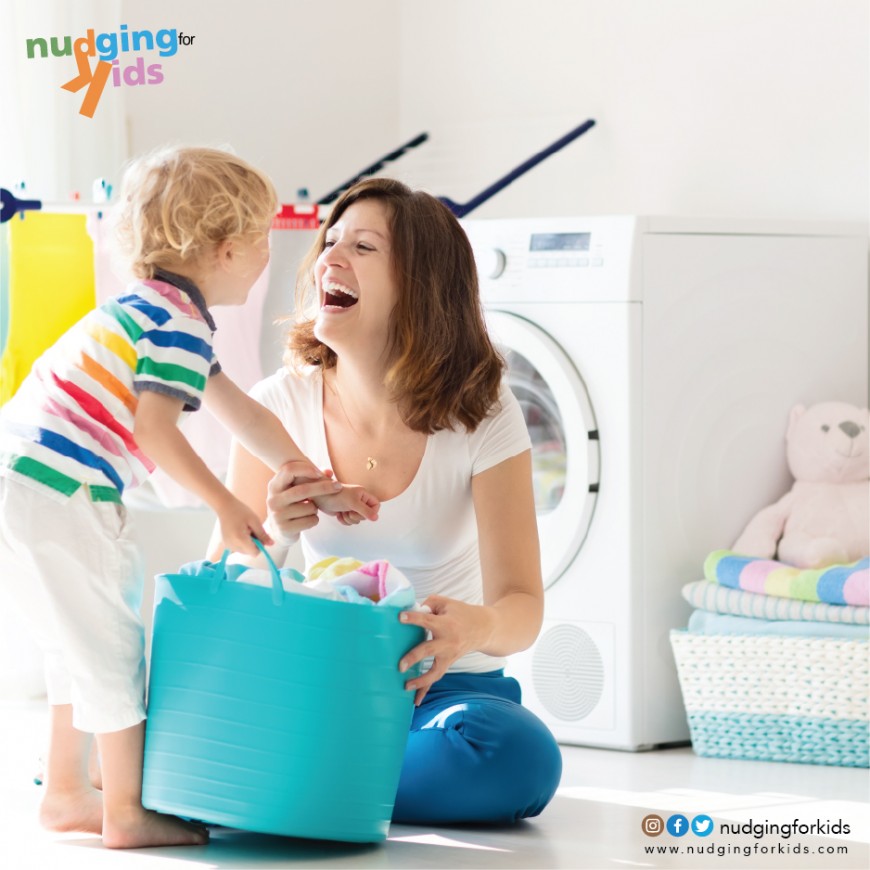28 May Shaping Independent Minds
Your child’s adult life may be several years or a few months away,but is always a good idea to start preparing them for the real world. There is no right time to do this. There is, however, a right way to gently push them – a Nudge minus the sludge (pain). Doing jobs for them is an exhausting cycle, and this helicopter parenting technique makes children feel less competent and confident in the long run. Whether your child is off to camp this summer or preparing to attend university soon, hereare some simple nudge interventions you can use to encourage independence in children across various ages – from toddlers to young adults:
Toddlers (ages3 to 6)

Start young when looking to form and sustain positive behavioral changes in the personality of your child. Create interesting choices for your children so that they believe that they, themselves, are actively choosing to partake in chores when in actuality, you are nudging them towards better choices. In psychological terms this is called the framing effect – a cognitive bias where people decide on options based on if the options are presented with positive or negative semantics; glass is half-full vs. glass is half empty. Let your childrenbe around when you are loading the washing machine or setting the table for a meal as such positive influencing behavior is highly beneficial to shaping their minds. Over time, help your children become more independent by teaching them to perform these tasks on their own.
NFK tip– Keep the chore simple and divide it up step-by-step to make the learning process painless for your children. For young toddlers, sing songs like ‘The Cleanup Song’ while cleaning up to make the chore more fun. Young kids also get bored very easily so ask them what task they want to perform instead of making them stick to the same chore every day.
Play the Clean Up song here: https://www.youtube.com/watch?v=oY-H2WGThc8
Tweens – (ages 7 to 12)
A great way to treat pre-teens like grown-ups and put some responsibility on their young shoulders is by assigning age-appropriate tasks to them. For example, give your tweens the responsibility of looking after the family pet– including ensuring that the pet is fed, taken to the vet and taken for walks by them. In terms of behavioral psychology this is known as the endowment effect – an emotional bias that says that once we own something (or have a feeling of ownership), we irrationally overvalue it regardless of its objective value. Therefore, children learn the value of things they believe they have ownership over and learn to increasingly take responsibility. Also according to early childhood curriculum developer and consultant Laura J. Colker Ed.D, allowing children to share the responsibility of pets assists in the child’s development of empathy and nurturing. (12 things you need to let kids do on their own, Jen Babakhan, Reader’s Digest)
NFK tip –Getting a pet is a great nudge intervention especially for parents with single children. Besides imbibing human values such as empathy, loyalty, and unconditional love, kids can also learn life skills from their pets.

Read this article to know more about the positive effects pets have on kids – http://www.oprah.com/relationships/10-reasons-pets-are-good-for-kids
Teens (ages 13-19)
Getting young adults motivated to work is a challenging task. Helping teenagers grasp the financial intricacies of running a house is an important yet difficult undertaking. Start small for younger children by giving them specific tasks such as grocery shopping with fixed budgets in hand. For older teens, parents can explain financial concepts such as having savings by setting an example. If your children want to go on a holiday sit down and chalk out a financial plan for them, taking into consideration the cost of the trip, breaking down how much they would have to save per week or month to be able to meet the costs of the holiday.

NFK Tip –Encourage children to start paying their own phone bills or allow them to contribute to groceries once in a while. Don’t forget to praise their efforts when they succeed in doing something good for themselves or the home because this works like a strong positive reinforcement for your teen.
Here is an informative story from Forbes on young adults and their expenses – https://www.forbes.com/sites/nextavenue/2019/05/12/adult-kids-expenses-which-should-parents-pay-for/#895381d2da03
Do you follow any innovative ideas or want to share your thoughts on raising independent children? Write into us [email protected]
Provide an email address. We at NFK would love to hear your story.


